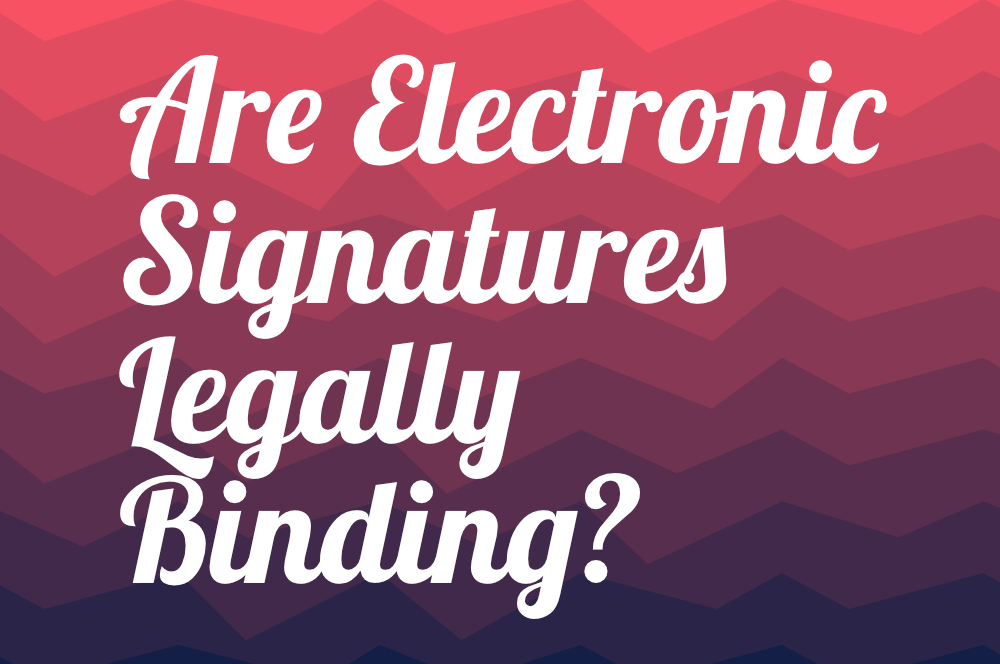
 Legally Binding eSignaturesElectronic signatures have revolutionized the way businesses handle documentation and contracts. By providing a quick, secure, and efficient means of signing documents, they have become an essential tool for companies looking to streamline their processes. But despite the numerous advantages they offer, many still question the legality of electronic signatures. In this comprehensive overview, we will address the question: are electronic signatures legally binding?
Legally Binding eSignaturesElectronic signatures have revolutionized the way businesses handle documentation and contracts. By providing a quick, secure, and efficient means of signing documents, they have become an essential tool for companies looking to streamline their processes. But despite the numerous advantages they offer, many still question the legality of electronic signatures. In this comprehensive overview, we will address the question: are electronic signatures legally binding?
Understanding Electronic Signatures
Before diving into the legality of electronic signatures, it's essential to understand what they are. An electronic signature is a digital mark or symbol that a person adds to a document to indicate their agreement or approval. This can include anything from a typed name or initials to a scanned image of a handwritten signature. Electronic signatures come in various forms, with advanced solutions such as digital signatures adding an extra layer of security through encryption and authentication.
Legality of Electronic Signatures
Electronic signatures are considered legally binding in many countries around the world, with laws and regulations in place to ensure their enforceability. Here's a look at some of the most prominent examples:
United States: The United States enacted the Electronic Signatures in Global and National Commerce Act (ESIGN Act) in 2000, which established the legal validity of electronic signatures for transactions in all 50 states. The Uniform Electronic Transactions Act (UETA) also supports the legality of electronic signatures, with 47 states having adopted it in some form.
European Union: In the European Union, the Electronic Identification, Authentication, and Trust Services (eIDAS) Regulation came into force in 2016. This regulation provides a legal framework for electronic signatures, ensuring their validity and enforceability across all EU member states.
New Zealand: Electronic Transactions Act 2002. This act grants electronic signatures the same legal status as traditional, handwritten signatures, as long as certain requirements are met. The Electronic Transactions Act 2002 promotes the use of electronic transactions and supports their validity and enforceability in New Zealand.
Canada: The Personal Information Protection and Electronic Documents Act (PIPEDA) governs electronic signatures in Canada. It recognizes the legal validity of electronic signatures, provided that specific requirements are met, such as the use of a secure and reliable method for identifying the signer.
Australia: The Electronic Transactions Act (ETA) in Australia validates electronic signatures and provides guidelines for their use in legal documents and transactions.
These are just a few examples of the legal frameworks in place that support the validity and enforceability of electronic signatures. However, it's important to note that the legality of an electronic signature may depend on the specific jurisdiction and the nature of the document being signed.
Requirements for Legally Binding Electronic Signatures
While electronic signatures are legally binding in many cases, there are certain requirements that must be met to ensure their enforceability. These are all supported by GoodSign:
- Intent to Sign: The signer must demonstrate a clear intent to sign the document electronically.
- Consent to Electronic Transactions: All parties involved in the transaction must agree to use electronic signatures.
- Signature Attribution: The electronic signature must be uniquely linked to the signer and clearly identify them.
- Document Integrity: The electronic signature must be attached to the document in a way that ensures any changes made after signing are detectable.
- Record Retention: A secure and accessible record of the electronically signed document must be maintained.
In conclusion: electronic signatures are legally binding in many countries, provided they meet specific requirements and comply with the relevant laws and regulations. It is essential to understand the legal framework in your jurisdiction and ensure that your electronic signature solution adheres to the necessary guidelines. By doing so, you can take advantage of the numerous benefits electronic signatures offer while ensuring their enforceability and validity in legal transactions.